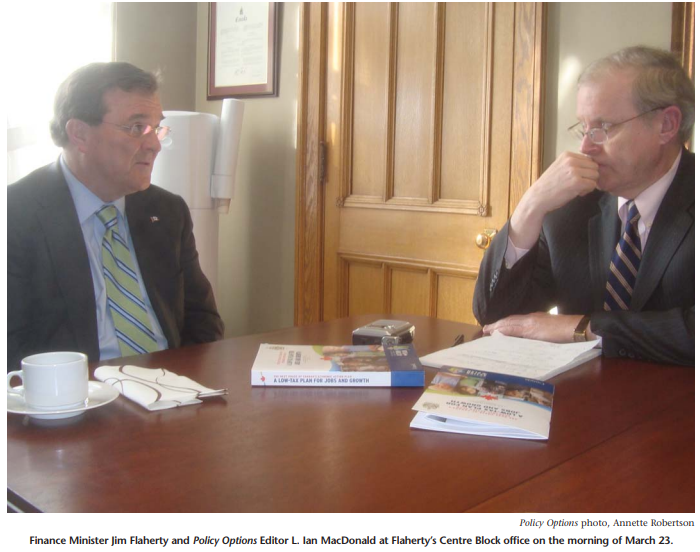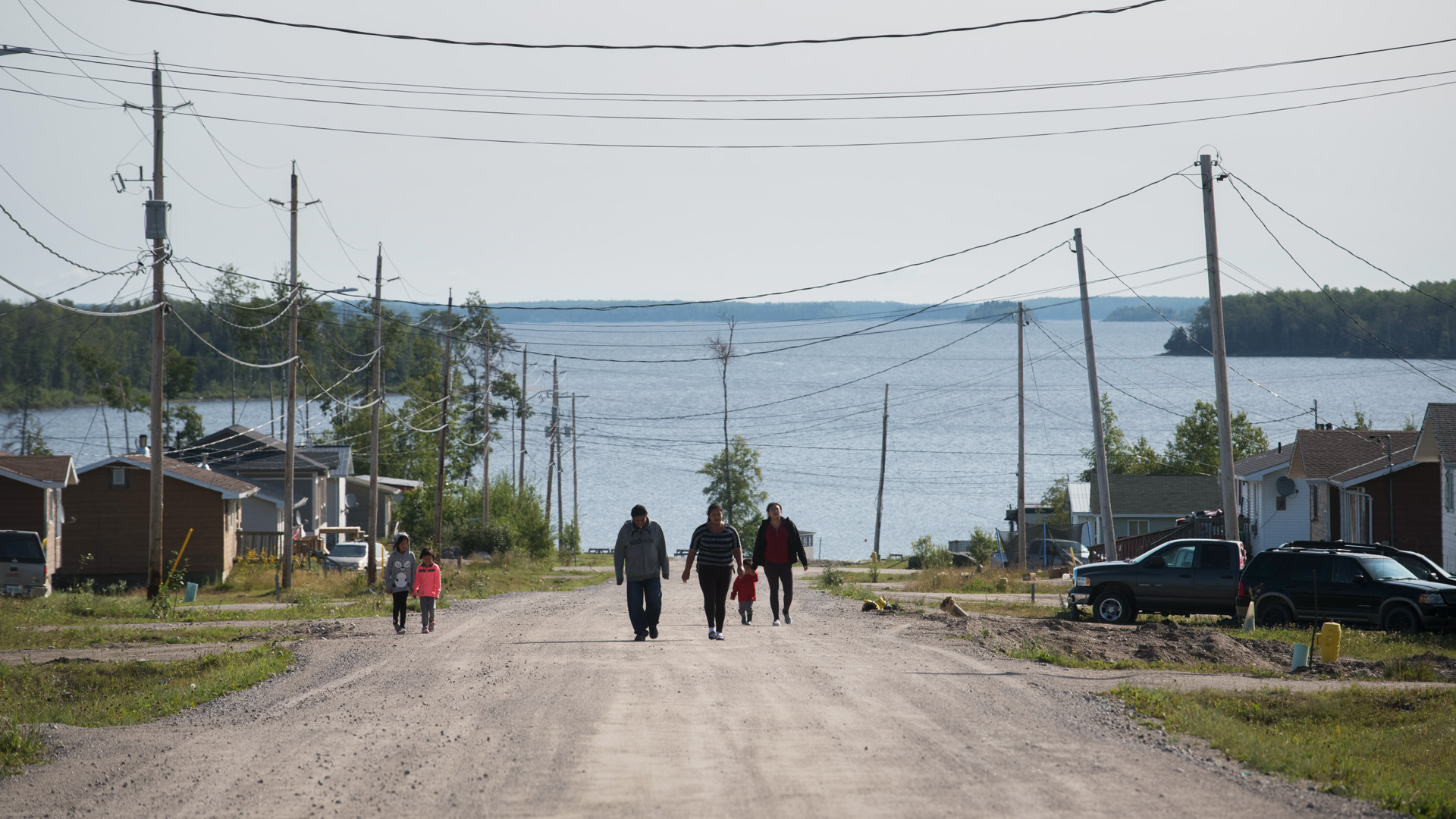
POLICY OPTIONS: Mr. Flaherty, thanks for doing this. The opposition parties are pretty unanimous in saying they’re not going to be supporting the budget, including the NDP. And we appear to heading into an election. How’s your comfort level about running on this budget?
JIM FLAHERTY: High. The voters are the ultimate deciders. I’m disappointed that the opposition parties decided to defeat the budget before reading it. I’m particularly disappointed in the NDP because we had substantial discussions with them.
And a lot of what they wanted is in the budget. So for Jack Layton to announce almost immediately after 4 o’clock yesterday that he was going to vote against the budget is a disappointment. Having said that, this is a good election document. And I’ll be happy to trail across the country and ask voters to support the budget.
PO: So you’re happy to run on this budget?
JIM FLAHERTY: Absolutely.
PO: And having presented it, you’re comfortable with running on it, whether it’s accepted or defeated?
JIM FLAHERTY: Absolutely.
PO: Were you surprised that Mr. Layton — how quickly he came out?
Because the feeling in the lockup among the journalists was there was enough comfort there, enough cover there for the NDP to be on board.
JIM FLAHERTY: Yes, you know, we went a long way to try to satisfy the demands of the NDP. We’ve had a lot of discussions with the NDP and their representatives, including their representatives in the union movement.
PO: It seems to me to be a budget that is less about fiscal frameworks and economics, although those elements are there, than a political document. There are a lot of elements in the budget that are aimed to consumers. For example, the tax credit for children’s cultural programs. I have a 21-month-old daughter. And at my house we are calling this budget “Zara’s Music Lessons.”
JIM FLAHERTY: [Laughs]
PO: I mean, were there elements that you put in the budget so that you could run on them in the event you were defeated?
JIM FLAHERTY: Well, absolutely, we’ll run on the entire budget. There are really two things happening in this budget: first of all, ensuring that we have a track that is consistent and doable to get to a balanced budget in the medium term. We do. We have the support of the private sector economists on it. We even went further than they wanted us to go in terms of an adjustment for risk over the next four years. We have a substantial adjustment for risk going out. So I’m satisfied with the fiscal track. And we will have a balanced budget. In fact, we may balance a year earlier. It may balance in 2014-15 instead of 2015-16.
No, I’m very comfortable with that. The other thing that’s going on in the budget is the result of listening across the country for three months. And what are people actually concerned about? They’re concerned about their jobs and so on. And that’s the first part, we’re making sure that we balance the budget and are fiscally responsible. But also the EI steps will take in continuing work sharing, making sure we target older workers and industries where they need to be retrained. All of those things we heard.
And then the family issues. Caregivers is a big issue. And I heard a lot about that across Canada. A lot of people with aging parents in particular are worried about their care. So that issue is important. Then it’s the first time the federal government has acted in that area. And then looking at — as we do every budget and this is the sixth one — when you look at who’s poor in Canada, fortunately there aren’t many people who fall below the poverty line in Canada, and among seniors it’s less than 5 percent now, which is a tremendous improvement in the last 20 years or so again.
But there are some widows, in particular, single older women who do need the help. They don’t have much in the way of a pension income because they’re from that generation where they raised children, worked hard in the home, but didn’t work outside the home, so they didn’t contribute to the Canada Pension Plan. And they…you know, we try to target where the money would go: $300 million to those people who actually need it.
PO: Is this personal with you? Because I once met Mary Flaherty, your mother, who was then 92 years old…
JIM FLAHERTY: That’s right.
PO: And had raised a family and was a widow.
JIM FLAHERTY: Yes, that’s right. And that generation you know, who had that experience, is different than the generation…
PO: They were what Tom Brokaw called the Greatest Generation…
JIM FLAHERTY: Yes.
PO: Who won the war and built the peace, and the industrial society we enjoy today.
JIM FLAHERTY: That’s right. Lots of kids too.
PO: In terms of the fiscal frameworks, if I can just come back to that for a moment, Ottawa is famous for low-balling numbers as we know. Have you built all the contingencies into this budget, when you say you might balance a year earlier than in 2015?
JIM FLAHERTY: One of the struggles in this budget is how do we create more fiscal room in the future, because we have accumulated more public debt because of the Great Recession. How do we reduce taxes in the future? And how do we make sure that we can maintain a balanced budget? That’s why we have the strategic and operating review in here. And that’s going to be a serious effort the next year in government, to actually [get] a 5 percent savings in direct program administration across the government.
We’re going to get some outside advice on it, as well as have Treasury Board, in a special committee, deal with it. It’s not dramatic. It’s not like the mid-nineties. But it’s serious. And we need to find that kind of saving, so that in 2014-15, out there, we’ll be able to have that kind of flexibility.
PO: Are you satisfied, as these outcomes demonstrate, that the deficit and the debt issues are cyclical, not structural?
JIM FLAHERTY: Absolutely, we do not have a structural deficit in Canada. We’d run the risk of having one if we didn’t take the actions that we’re taking.
PO: And is it because of issues such as aging populations and change in demographics that we need to address these issues?
JIM FLAHERTY: The demographics are important. Fortunately, we have good growth in Canada. It’s a moderate growth, but we have good growth in Canada. We’re in much better shape than the other advanced economies. And that’s all good. But having said that, government tends to grow organically and just gets bigger. And when I look at the numbers over the course of the last several years, they concern me that we see this organic growth of government.
Part of it was due to the Economic Action Plan. And that was necessary. And the public service did a terrific job on getting that money out the door and in a responsible way. And the Auditor General looked at that and gave the government a clean bill of health on that. Having said that, we have to watch the tendency every time the government does something to create a larger bureaucracy. And so we have to analyze what we’re doing and try to be more effective, more efficient.
PO: When you talk to your G7 and G20 colleagues how do they respond or interact with you about how Canada has come out of the recession with such strong fundamentals, from job creation to the fiscal frameworks?
JIM FLAHERTY: Well, they’re very positive about Canada’s story. Among the finance ministers at a recent G20 review, the US Treasury Secretary, Tim Geithner, referred to “virtuous Canada.” And, you know, the British Chancellor of the Exchequer, George Osborne, who is doing his budget today, said to me recently: “You’re so fortunate in Canada. You don’t have to do the kind of drastic things that I have to do in the United Kingdom.” Reducing his public service budget and so on by 25 percent. These are draconian things to do that end up with tens of thousands of people losing their jobs. We’re not facing anything like that in Canada. But all the more reason to be careful and to make sure that we’re prepared again for the next crisis.
PO: And when you go out there and talk outside this bubble of Ottawa, talk to people in the real world in Canada, do you get a sense that Canadians understand that we come out of this recession better than other G7 countries?
JIM FLAHERTY: Yes, and Canadians are proud of that actually. And I hear it from airport workers. I hear it from business people. I hear it from small business people. I hear it from everybody actually, across the country, that they’re proud of the fact that our country was better prepared and came out of this Great Recession in better shape than other countries.
There’s also a sense of insecurity, though. And a lot of what we said in the budget is about security. We used the word a lot in the budget, and making sure that we plan for the future.
I think people are naturally worried because of things like the recession, because of what they’ve seen happening in the United States, the continuing decline in the housing market in the United States. Because there are worries about what happened in the European sovereign debt situations: Portugal, Greece, Ireland. And then the natural disasters: what we’ve seen happening in Japan. So there’s a level of worry there that demands a response, that demands an emphasis on security.
PO: And when you look at the Canada-US comparatives, our deficit being 3 percent to theirs being 11 percent, our federal debt being 30 percent to theirs crossing 100 percent of GDP next year, do you still worry on behalf of the Americans? When you talk to Tim Geithner, how does that conversation go?
JIM FLAHERTY: Well, I worry on behalf of Canadians because of the Americans. This is the same worry the Prime Minister and I had back in 2006 when we first became government here, about deficits and debts. And that the American economy is the largest economy, the world’s most dynamic economy. But all economies can only handle so much debt. And the markets have made it clear, across the world, in the last couple of years that at some point they will call sovereign governments to account.
PO: We see in Ireland and Greece and Spain, at some point do the international financial institutions show up in Washington where they’re based and walk down the street to the White House and say: “Give us back the keys to the car…”?
JIM FLAHERTY: I think it’s manageable. I’ve had these discussions with [Federal Reserve Chairman] Ben Bernanke and Tim Geithner of course and with Bob Zoellick with the World Bank and with other finance ministers in the G7-G20. I think the real need in the United States is a clear plan. Their system is difficult.
Our system is difficult enough with a minority government. But their system is difficult. I talked to Erik Cantor about it, the Republican majority leader in the Congress [House of Representatives]. And I’ve encouraged them to have a plan that makes sense going forward. Not that they will resolve their deficit and debt problem overnight. But a medium-term plan that will give people confidence that the government knows its direction, knows where it’s going, and how it’s going to get back to a more reasonable fiscal situation.
PO: President Obama’s budget is to reduce the deficit to $500 billion by the end of this decade from the current $1.6 trillion.
JIM FLAHERTY: I talked to his budget adviser recently in a meeting I was at. And it’s a different system. I mean, his budget proposal is sort of the beginning of the conversation. When we do a budget in our parliamentary system, it’s the end of the conversation.
PO: Yes, but when you consider that their deficit exceeds our GDP, it’s a little bit mind-boggling, isn’t it?
JIM FLAHERTY: It is. And we all travel to the United States and so on and there is a certain malaise among Americans that is a concern. And it’s not answered simply by anger at government.
PO: Do you think that, when Canadians reflect on our situation compared to the Americans that they understand that our economy has created half a million jobs, more than were lost in the recession? And in the US, seven million jobs are never coming back. And six million Americans have lost their homes.
JIM FLAHERTY: Yes, I think Canadians are justifiably proud of the performance of the Canadian economy and job creation. I think also, though, Canadians recognize our need to have a successful US economy for our own well-being. And that it’s important that the American economy recover. And it’s in our self-interest to encourage the Americans to be fiscally responsible.
PO: So there’s no bragging rights in that?
JIM FLAHERTY: Well, sure there are. But Canadians aren’t like that anyway, generally speaking.
PO: But we need a strong American economy as our largest trading partner, don’t we.
JIM FLAHERTY: Sure, but the other thing that’s quite clear from my listening to Canadians is they want us to expand our trade with the European Union, with India, with China, with the emerging economies. That they get it that the world is changing. That the balance of economic growth has moved to Asia.
PO: One of the kind of below-the-top line stories in the budget is what’s in there for small business. And clearly it reflects, for example, the one-year vacation from new hires being compensated to pay EI premiums on them. Is this a reflection of your conversations with small business over the last several months of your consultations?
JIM FLAHERTY: Yes, it does. And it reflects the reality that most of the job creation in Canada is by small business.
PO: Right, one of the lines that jumps out of the budget is that we have 525,000 small businesses in this country.
JIM FLAHERTY: No, it’s an interesting economy in Canada. We’re not a big-business economy. The American economy is much more oriented toward big business enterprises. We’re a much more SME-oriented economy.
PO: Right. And what are you hearing from people as you go through airports and so forth about where we are?
JIM FLAHERTY: We’re walking through Pearson Airport the other day, three guys in their blue overalls who were having a coffee at Tim Hortons yelled up my name and waved down and said: “Keep up the good work.” That’s the kind of thing that matters, especially to a Conservative, that we’re affecting positively the attitudes, the lives of working people in Canada. That’s a good thing.
PO: To come back to some of the things you’d like to run on, in the budget, this seems to me the fiscal frameworks are covered. But it’s more of a political document than an economic one. Isn’t that one that you could run on if you had to? [Laughs]
JIM FLAHERTY: Oh yes, and it looks like we’ll have to.
That’s OK too. I mean I’m more than comfortable. In fact, after I got over the initial surprise yesterday of Jack Layton announcing almost right after 4 o’clock that he was going to oppose the budget, when I reflected on that, I thought: “What a wonderful opportunity to travel across the country, saying to Canadians, do you support this budget or not?” And there’s the big picture, you know the responsible government fiscal prudence. But there are also responsive things like the caregiver tax credit that Canadians actually want.
PO: And the thing on the GIS, which I call the Mary Flaherty clause.
JIM FLAHERTY: Yes, yes, well, that’s important. That’s important.
Photo: Shutterstock










